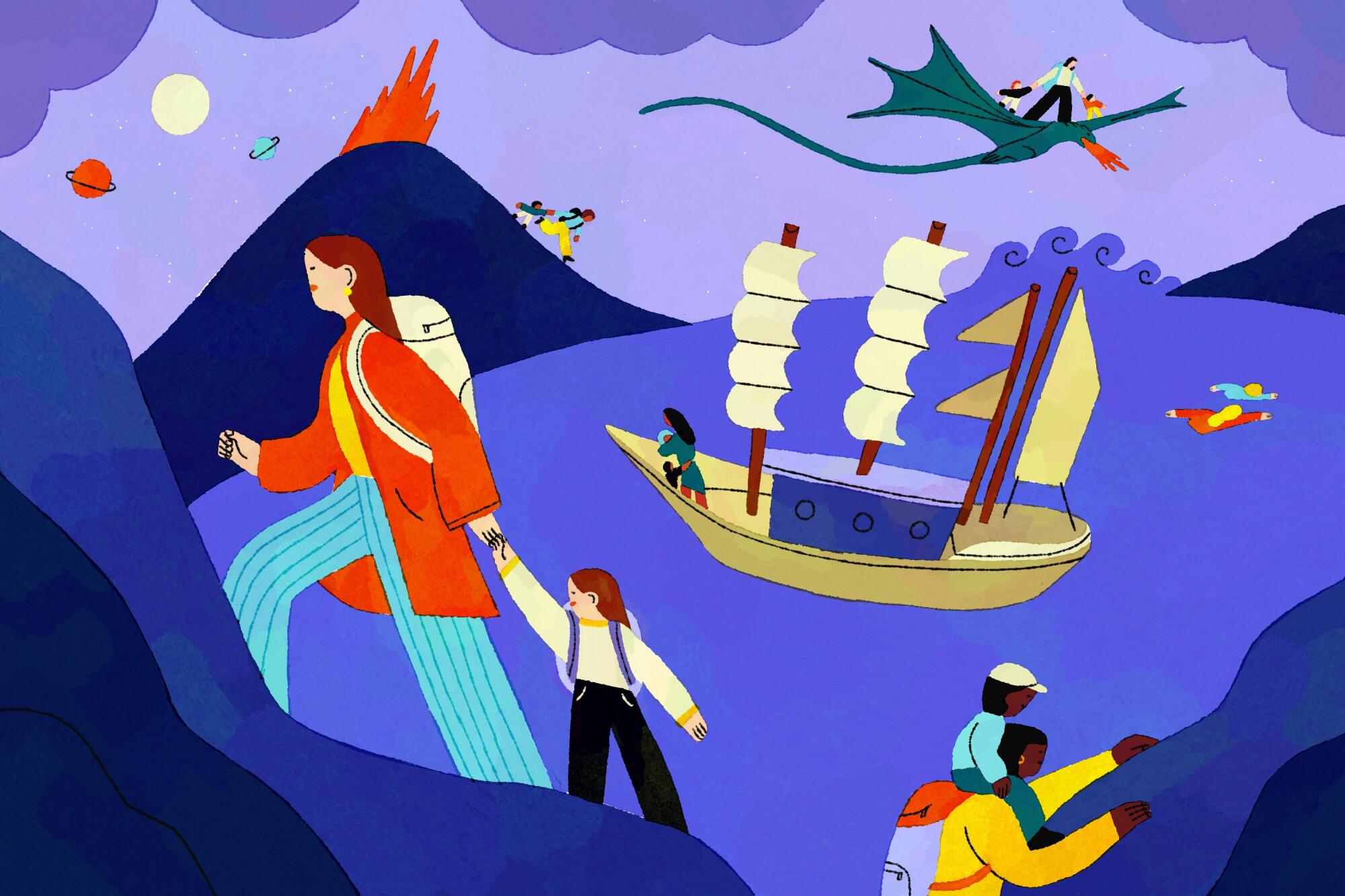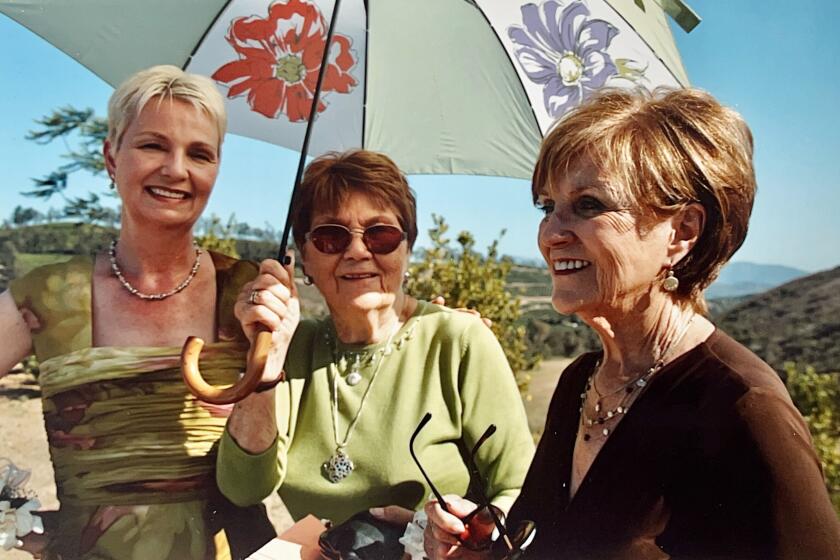
- Share via
My first meaningful brush with the Hero’s Journey took place in 11th-grade English class.
Our teacher read us Henry David Thoreau on leaving home and heading out on one’s own in order to find wisdom and transcendence, and to avoid being one of the mass of men leading “lives of quiet desperation.” Her deepened voice underscored the gravity of these words.
“Yes!” I remember thinking and went on to spend a good deal of my teens and 20s searching for the rough diamonds of truth and meaning according to “Walden’s” recipe.
Thoreau’s belief in the necessity of leaving one’s home and loved ones for what you might call a “good” or “interesting” life wasn’t unique. Narratives from the “Odyssey” and “Star Wars” to “Eat Pray Love” and “Wild” employ a similar framework, in which lead characters set out on their own in order to pursue a life story worth retelling.
The image Lester Sloan took of Hockney has become a hall of mirrors, an entrance into the very notion of what a mother means. What it means to lose her.
Such narratives resonate; I’m a fan. But it took me becoming a mom to question the dominance of the Hero’s Journey, and the many inaccurate, patriarchal and pernicious assumptions it rests on. Independence doesn’t necessarily trump interdependence for self discovery; the public sphere doesn’t necessarily trump the domestic sphere as the place where big things happen.
Back in the 1940s literary scholar Joseph Campbell identified the Hero’s Journey in a variety of cultures and time periods. First, the hero must depart from familiar circumstances — “the world of common day,” as Campbell wrote. Next, they enter a special world — “a region of supernatural wonder” — where they are faced with a trial. There is a crisis, they struggle, and then “a decisive victory is won: the hero comes back from this mysterious adventure with the power to bestow boons on his fellow man.”
When I first became a mom, I was frustrated by the assumption that my chance to go on a Hero’s Journey was over because big adventures don’t happen to those who have to stay at home and take care of the kids. But with time, a deeper grievance kicked in. I saw how Campbell’s formula stops us from seeing how parents like me experience life-altering, wisdom-inducing trials and triumphs all our own, at home and alongside the loved ones who depend on us.
As I decide if I want to have kids, and my mother is thrust into the role of caregiver, we each find ourselves with parenting at the center of our lives.
For me, it all began within the walls of an 800-square-foot apartment.
First, I left behind a deeply familiar childless existence. Goodbye, independence. Onward to a new existence, one in which my body, my mind and even my living room was rendered foreign by the presence of my first baby, Augie, barely bigger than a loaf of bread.
The crisis? What wasn’t a crisis? I had to make sure this vulnerable human survived, and, if all went well, thrived. I had to rediscover who I was, and what it meant to be a human, now that I had a child. There was struggle, and, eventually, a return of sorts as I made peace with being someone who someone else depends on. Along the way, I discovered the kinds of rough diamonds of truth and meaning that family life can provide: More deeply than I ever had before, I understood just how hard and just how important it is to try to truly connect with another.
Unlike with traditional heroes, there is no end to a mom’s journey. The dynamics of entanglement and unraveling, strife and ease, are ongoing. In fact, accepting that reality, that in real life the struggle rarely completely ends, is another rough diamond.
Now I want everyone to see what I see. Caring for another can be a Hero’s Journey.
For a family established by immigrants, there’s an extra dimension of grief when those who were born in the old country are gone.
When we view it through this lens, raising a child is epic. It also helps free us from the lousy, simplistic binaries often applied to motherhood in particular — the still ubiquitous notion that being a mom is either a fairy tale or a nightmare, an experience of unbridled joy or merciless destruction.
When we think of motherhood as a Hero’s Journey, the highs and lows, and the moments of feeling lost and found, are part of a single story, one in which an encounter with a meaningful challenge leads to profound insights about ourselves, other people and life itself.
To be clear, I am thrilled to live in an age when women can go on solo adventures in pursuit of self-discovery like Campbell’s heroes. I am not calling for an end to women journeying outside the home. Instead, I want to raise up the many domestic and familial Hero’s Journeys that have long been ignored.
And not just mothers win when we think of care as a Hero’s Journey.
We all have something to gain in imagining a pathway to wisdom, respect and hero status that relies more on human connection than rugged individualism and brawn. In this age of increased loneliness and isolation, a cultural template that honors the difficulty and complexity of being in intimate relationships, and the potential rewards for sticking with them, might encourage people to invest more in long-term connections. Even when they are inconvenient. Even when doing so requires the slaying of a few dragons.
Delight your mom with the gift of spending time together on a lovely walk in Los Angeles. Here are some scenic routes to check out.
View care as a Hero’s Journey and we just might treat those caring for a resolute toddler or teen or helping a parent with dementia with the same curiosity and respect we treat someone who just climbed Mt. Everest. Doing so wouldn’t lessen the demands of care, but it would give the wisdom gained from the experience the respect it deserves.
Perhaps eventually this shift in understanding would lead to more practical support for parents and caregivers. Even the greatest heroes sometimes get help from a sidekick, or an otherworldly intervention, to make it through alive.
My kids are 8 and 12 now. The extreme physical and emotional conditions of early motherhood have faded, but the existential struggles remain. How much should I protect them from pain? Direct them toward pleasure? How much of myself do I give to them? And how much do I protect, carving out time for those Thoreau-style solitary adventures that I still need and desire?
Campbell would probably have seen my lunch-packing, carpooling life as taking place in the “world of common day.” I don’t. Wrestling with the big physical, philosophical and spiritual questions surrounding motherhood has, as I see it, clearly landed me in a “region of supernatural wonder.”
Elissa Strauss is the author of “When You Care: The Unexpected Magic of Caring” and the newsletter “Made With Care.”
More to Read
A cure for the common opinion
Get thought-provoking perspectives with our weekly newsletter.
You may occasionally receive promotional content from the Los Angeles Times.










